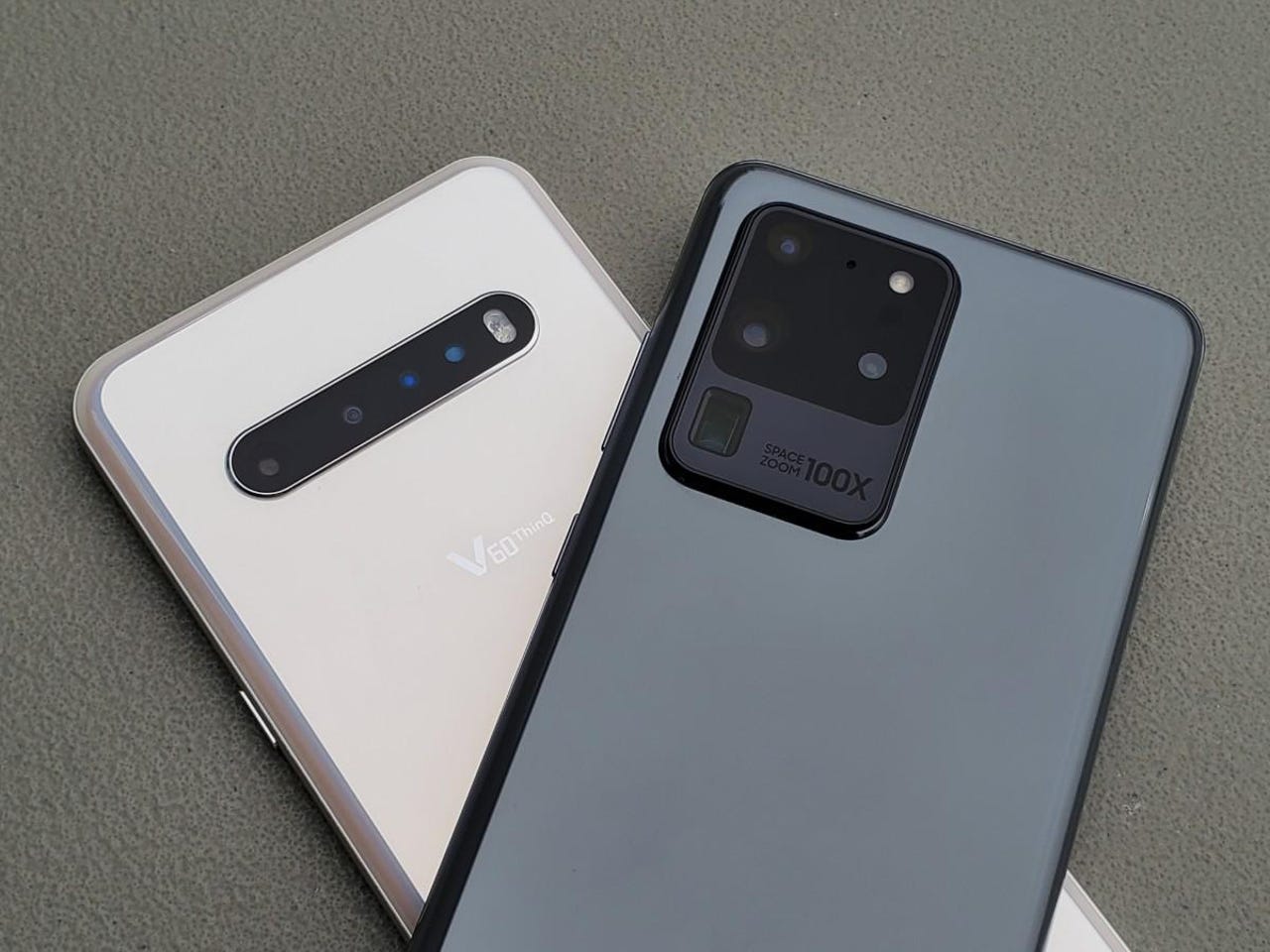LG V60 ThinQ vs Samsung Galaxy S20 Ultra: Which big 5G phone is best for your business?


The Samsung Galaxy S20 Ultra 5G, see our full review, is available now while also starting to receive its first update from Samsung. The LG V60 ThinQ 5G, see our first impressions, launched last Friday. There is a $500 difference in price between the two so check out where they differentiate below to see which 5G phone best fits your business needs.
5G and camera improvements are primary selling points of both devices and something that sets them apart from the Apple iPhone and other less expensive phones. They are both large phones so if you want a smaller phone then this article is not for you. Size does come with the benefit of large batteries and large displays for getting work done on the go.
Also: Samsung Galaxy S20 Ultra 5G review: 2020's most capable smartphone is good for business
Tale of the tape
Specifications don't provide the complete picture regarding the capabilities of a smartphone, but they are useful for comparison purposes and to provide you with an indication on what each device offers.
| Feature | Galaxy S20 Ultra 5G | LG V60 ThinQ 5G |
| Display size | 6.9 inches | 6.8 inches |
| Processor | Snapdragon 865 | Snapdragon 865 |
| Dimensions | 166.9 x 76.0 x 8.8mm | 169.3 x 77.6 x 8.9mm |
| Weight | 220g | 214g |
| RAM | 12GB LPDDR5 | 8GB |
| Internal storage | 128GB | 128GB |
| Battery capacity | 5000mAh | 5000mAh |
| Rear cameras | Four: 48MP tele, 108MP wide, 12MP ultra, 3D depth | Three: 64MP wide, 13MP ultra, 3D depth |
| Front cameras | One 40MP | One 10MP |
| Other | 120 Hz display, 10x optical hybrid zoom | MIL-STD 810G rating, 3.5mm audio port |
Both phones are built with IP68 rated dust and water resistance, can record 8K video content, have microSD card slots for low-cost storage expansion purposes, support wireless charging, and include large 5000 mAh batteries to help power you through at least a day. However, there are some unique features in each device to consider so let's take a closer look at those.
Unique features of the Samsung S20 Ultra 5G
Samsung launched three new S20 models with the S20, S20 Plus, and S20 Ultra. They all have many common features, but the Ultra 5G is definitely the top model at a starting price of $1,400.
- 5G: Both phones support 5G, but the S20 Ultra has no limitations on support for various networks. When you buy the S20 Ultra, it comes with support for low-band, mid-band, and high-band networks so can be used across all major US carriers. The LG V60 is carrier specific with different band support for your preferred carrier.
- 120 Hz display refresh rate: The 90 Hz display on the OnePlus 7T Pro McLaren 5G spoiled me and now using the 120 Hz one on the Samsung S20 Ultra may have ruined me for life. These higher refresh rates improve the scrolling experience and bring Android phones to parity with iPhones. The resolution at 120 Hz is 1080p, but the higher frequency is worth it.
- Samsung DeX functionality: Samsung DeX means you truly can use your phone to power your computing experiences and with something like the NexDock 2 you can even make that a mobile experience with a Samsung phone. While testing the NexDock 2, I found that LG supports some basic desktop mode functionality due to native Android 10 support, but it is nothing like DeX.
- Display resolution: Both phones have excellent OLED displays, but Samsung offers a higher resolution than LG. I have always switched my Samsung phones to 1080p since I cannot see the difference so this isn't really a factor for me.
- Wireless PowerShare: It's nice to have the ability to top up your Galaxy Buds or Galaxy Watch with your phone and I've actually had to use this three times when my accessories died while on the go. It's not essential, but the convenience can mean the difference between using an accessory or leaving it in a bag.
- Telephoto: LG has supported ultra-wide angle cameras for years, but there is no telephoto support in the LG V60. Samsung went to the extreme with its SuperZoom 100x telephoto and while that is more of a technology demonstration than something very useful, the 10x and 30x can help you capture content your eye can barely see.
- Advanced camera functions: Samsung has a few very cool functions in its camera software, including Single Take, super slow motion, live focus video, and advanced background options when capturing selfies.
Also: Samsung Galaxy S20 Plus review: The S20 that business users need
Unique features of the LG V60 ThinQ 5G
The LG V60 ThinQ 5G is available now from major US wireless carriers for $799.99 (T-Mobile price). For an additional $100, you should seriously consider the Dual Screen cover as well.
- Dual Screen cover: The LG Dual Screen cover significantly improves your productivity and I would argue even more so than the Galaxy Fold. It uses existing technology and advanced software to offer two large displays for serious multi-tasking. The great thing is you can simply pop out the LG V60 and skip the Dual Screen too.
- 3.5mm headset jack: Very few devices today still have a 3.5mm audio port, but you will find one on the LG V60. In addition, LG includes a Quad DAC so that audiophiles are sure to love what LG offers.
- Shock resistant rating: High dust and water resistant ratings are common today, but LG continues to provide a MIL-STD 810G shock resistant design. In addition, LG offers a two-year hardware warranty, another step towards backing up the design of the phone.
- Four microphones: LG's V series has always focused on the video capture experience and with the LG V60 we see four microphones to help you capture the highest quality audio. These mics support Voice Bokeh and ASMR quality audio so if you create videos with your phone, then it's tough to beat the LG V60.
Both phones are extremely capable and will help you get work done. My SIM card is spending more time in the LG V60 because of the usefulness of the Dual Screen cover, video capability, and lower price.
The Galaxy S20 Plus, see our full review, may be a closer comparison to the LG V60 with a starting price of $1,200 and a 64MP camera to match the LG V60. It has all of the other features of the S20 Ultra 5G, so you may want to look at this slightly smaller option if you like what I have listed for the S20 Ultra 5G.
Which phone meets your needs better?